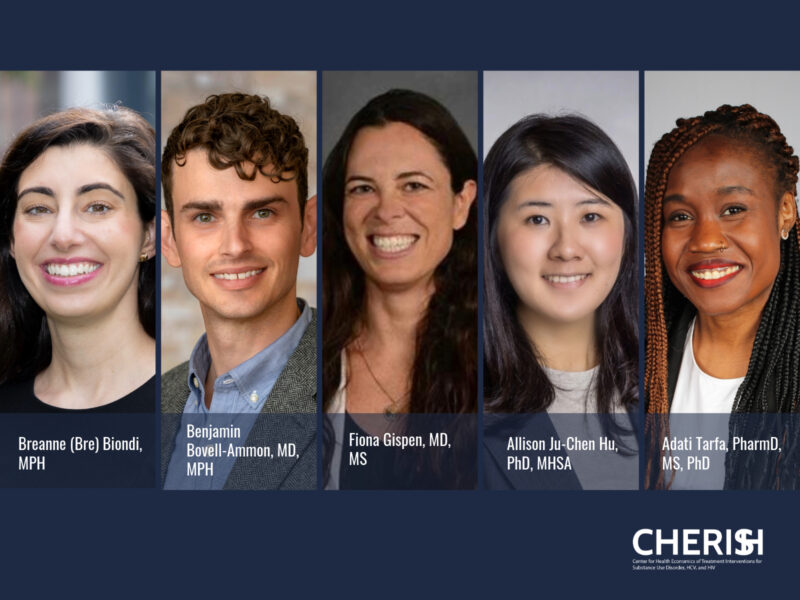Announcing the 10th Pilot Grant Cohort Advancing the Treatment of Substance Use Disorders, HCV, and HIV
Five CHERISH pilot grant finalists each receive up to $20,000 in funding between 2024 and 2025.

CHERISH is excited to welcome a new pilot grant cohort for the 10th year. Spearheaded by CHERISH Pilot Grant Program Director Brandon Aden, the program is designed to help researchers gain familiarity with health economic evaluations, apply related methodologies to their pilot research, and build out the next stage of their careers.
This year, CHERISH encouraged applicants to submit health economic research proposals that address viral hepatitis C (HCV) and HIV or explore the relationship between social determinants of health and health economic outcomes among people who use drugs. The awarded researchers will investigate how incarceration, Medicaid coverage, hospitalization, a mobile pharmacy, and prior authorization affect access to substance use, HCV, and HIV treatment and services.
Breanne (Bre) Biondi, MPH

Breanne (Bre) Biondi is a PhD candidate in health services and policy research at Boston University School of Public Health. Before starting her doctoral program, Biondi oversaw clinical studies and worked with research participants with opioid use disorder (OUD) and HIV. Biondi pursued her doctoral studies and the CHERISH pilot grant to further study and advocate for policies that improve substance use treatment, harm reduction, and gaps in health insurance coverage.
Biondi’s pilot investigation, “The Effect of Continuous Postpartum Medicaid Coverage Hepatitis C Care Among Persons with Opioid Use Disorder,” seeks to identify how Medicaid policies can improve coverage and health outcomes among people living with OUD and HCV. She will investigate whether the American Rescue Plan Act (ARP) and Families First Coronavirus Response Act (FFCRA), enacted to extend postpartum care and Medicaid coverage during the COVID-19 pandemic, improved access to OUD and HCV treatment for pregnant persons. She will leverage 2014-2023 data from TriNetX, a national linked database, to determine the effect of extending postpartum Medicaid coverage from 60 days to 1 year on HCV testing, linkage to care, and treatment with direct acting antivirals (DAAs) among postpartum persons with OUD.
Limiting postpartum coverage to 60 days after giving birth restricts access to routine postpartum care, OUD and chronic disease treatment, and mental health services. DAAs cure HCV, but their safety for use during pregnancy is still being studied, making the postpartum period a critical time for intervention.
Breanne Biondi, MPH
Based outside of Boston, Biondi’s ideal day is spent hiking in the Blue Hills Reservation with her partner and dog, followed by a visit to a local brewery.
Benjamin Bovell-Ammon, MD, MPH

Ben Bovell-Ammon is a researcher and general internist practicing addiction medicine at a community health center in Springfield, MA, and primary care at the Hampden County jail. A faculty member at the University of Massachusetts (UMass) Chan Medical School, he is passionate about mitigating health disparities related to mass incarceration and the criminalization of substance use.
People transitioning from incarceration to the community have a severe risk of overdose and other poor outcomes. Medicaid Accountable Care Organizations have the potential to support efforts to improve engagement in post-incarceration reentry services and improve outcomes for this population.
Ben Bovell-Ammon, MD, MPH
His pilot investigation, “Association of Incarceration with Utilization and Costs for Patients with Opioid Use Disorder in a Medicaid Accountable Care Organization,” examines Medicaid Accountable Care Organizations (ACOs) in Massachusetts and their impact on the health outcomes of incarcerated individuals with OUD. He plans to explore how value-based care policies in Medicaid, such as ACOs, can align health equity goals with the financial incentives of health plans. Bovell-Ammon and his team will build a new linked dataset, inclusive of healthcare and correctional institutions, and analyze healthcare utilization and costs among Medicaid ACO members with OUD who have been incarcerated. The CHERISH pilot grant will also support Bovell-Ammon’s goal of becoming an independent clinician-investigator.
Residing in Boston, a day well spent for him includes a run through Franklin Park or the Arboretum, a picnic at his 4-year-old’s favorite playground, and a catching live theater production with good food and drinks.
Fiona Gispen, MD, MS

Fiona Gispen is a physician and an infectious diseases fellow at New York-Presbyterian/Weill Cornell Medical Center. Her time as a fellow has given her firsthand experience treating patients with serious bacterial infections related to drug use and witnessing the challenges and stigma associated with their hospitalizations. As a CHERISH pilot grant recipient, Gispen plans to address the high rates of patient-directed discharges (PDD) among people who inject drugs (PWID) and identify an effective treatment strategy for infective endocarditis, a serious bacterial infection prevalent among PWID.
We have historically recommended lengthy intravenous (IV) antibiotic courses, which many PWID struggle to complete due to difficulty arranging outpatient IV therapy and high rates of PDD. Recent smaller studies suggest that transitioning to oral antibiotics likely offers a viable treatment alternative.
Fiona Gispen, MD, MS
Her pilot investigation, “Discharge Decisions: The association between antibiotic strategies and subsequent healthcare utilization in Medicaid-enrolled people who inject drugs with infective endocarditis” will use Medicaid claims data to compare the effectiveness of antibiotic prescribing strategies. By studying and characterizing alternative treatment strategies, Gispen and her team hope to improve health outcomes, reduce hospitalization duration, and reduce healthcare costs for infective endocarditis among PWID, a population that faces unique socioeconomic and clinical challenges.
Gispen is a Brooklynite New York City resident. A day well spent includes an outdoor breakfast at Café Mogador, shopping or taking an aerial class in Greenpoint, and visiting the Museum of Modern Art. She enjoys winding down in Williamsburg, where she would dine at Rule of Thirds and take a sunset walk in Domino Park to soak in the views of the East River.
Allison Ju-Chen Hu, PhD, MHSA

Allison Ju-Chen Hu is a health services researcher and a postdoctoral associate at the Department of Population Health Sciences at Weill Cornell Medicine (WCM). She specializes in utilizing large-scale data to examine the effectiveness and unintended consequences of public health policies. Working alongside former CHERISH pilot grantees at WCM, including Yuhua Bao, Shashi Kapadia, Ali Jalili, Hao Zhang, and Revathy Suryanarayana, Hu applied for the CHERISH pilot grant to sharpen her policy, claims data, and difference-in-differences technique analytic skills.
Hu’s pilot investigation, “Prior Authorization Prohibitions and Buprenorphine Treatment Retention,” will inform our understanding of state laws that have removed prior authorization as a requirement to prescribe medications for opioid use disorder (MOUD).
Prior authorization has been identified as a significant barrier to buprenorphine treatment. In response, many states have enacted laws to eliminate prior authorization requirements for buprenorphine. However, evidence regarding the effectiveness of these legislative changes remains limited.
Allison Ju-Chen Hu, PhD, MHSA
As buprenorphine is an approved MOUD treatment in the U.S. that is widely available in office-based settings and dispensed at pharmacies, Hu hopes her pilot investigation will provide timely insights into how legislation, such as prior authorization requirements, impacts buprenorphine treatment retention. She will use 2014-2022 data from the Health Care Cost Institute to assess the effectiveness and comprehensiveness of state laws that have eliminated prior authorization between 2015 and 2022.
Working out of New York City, a perfect day for Hu includes biting into a classic lox bagel, visiting the Metropolitan Museum of Art, MoMA, or any museum, and strolling through Central Park.
Adati Tarfa, PharmD, MS, PhD

Adati Tarfa is a pharmacist and health services researcher. A postdoctoral associate at Yale School of Medicine, she works with Dr. Sandra Springer, director of the Integrating Substance Use Treatment Research with Infectious Disease for Everyone (InSTRIDE) lab, to pilot and implement InMOTION, a mobile pharmacy clinic program that brings providers, healthcare, and pharmacy services to underserved communities in Connecticut. She applied for the CHERISH pilot grant to learn how to capture and demonstrate the value of pharmacist-led services that address disparities in HIV and substance use disorder care.
Mobile clinics have achieved considerable success in combating infectious diseases such as HIV. A key limiting factor in expanding these [pharmacy-led mobile] services to vulnerable populations is the paucity of literature showing their impact on health outcomes. The knowledge I will gain through the grant will enable me to advocate for broader integration of pharmacy services in harm reduction efforts.
Adati Tarfa, PharmD, MS, PhD
Her pilot investigation, “Cost Analysis for a Retail Mobile Community Pharmacy Addressing Substance Use and HIV Prevention Services in Underserved Communities,” examines the startup and operational costs of deploying a mobile pharmacy clinic. Tarfa and her team also plan to develop and disseminate a resource to help pharmacists, community members, healthcare workers, and policymakers understand the budget needed to run and sustain a mobile pharmacy.
On her days off, Tarfa is devoted to supporting small businesses and writing Google reviews. Based in New Haven, she enjoys discovering stores focused on sustainability, visiting thrift stores, art stores, and restaurants, and writing glowing reviews that describe each place.
About the CHERISH Pilot Grant
Since 2015, the CHERISH pilot grant program has supported more than 30 researchers at the early stage of their careers. We are proud to have seen former grantees publish their pilot findings in journals, present at national conferences, leverage their pilot investigations to receive additional grant funding, and step into the next stage of their career development. The next round of applications will open in the coming weeks. Stay tuned to learn more about the next call for proposals.